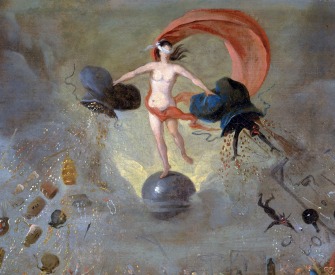When the day appointed for the election was come and the crier had called the first class, the eighteen centuries of horse, together with the eighty centuries of foot, consisting of the richest citizens, entered the appointed place and chose Lucius Quinctius Cincinnatus consul. And no other class being called to vote, the people departed. The senate sent proper persons to ask the consul to come to Rome and take possession of the magistracy. It happened that Quinctius was at that very time plowing a piece of land for sowing, himself following the oxen that were breaking up the fallow land without a vest, his waist girded, and a cap upon his head. Seeing a great number of men come into the field, he stopped his plow and could not for a long time conceive who they were and what they wanted with him. When one of them came up to him, wishing to dress himself in a more becoming manner, Quinctius went into his cottage and, putting on his clothes, came out to them. Upon which the persons who were sent to conduct him to Rome all saluted him, not by his name, but as consul—and, clothing him with the robe bordered with purple and placing before him the axes and the other ensigns of his magistracy—asked him to follow them to the city. Making a short pause and shedding tears, he said only this: “I see my land will be unsown this year, and we shall be in danger of not having the wherewithal to subsist.” After that, he embraced his wife and, charging her to take care of his family concerns, went to Rome. The only reason that induced me to relate all these particulars was to let all the world see what kind of men the Roman magistrates were at that time: that they worked with their own hands and were temperate, that they were not uneasy under innocent poverty, and were so far from aiming at regal power that they refused it even when offered.
Quinctius, having entered upon the consulship, gave judgment in all cases where the suitors desired it—a thing which had long been delayed—and he himself decided the greatest part of the suits with equality and justice, sitting the whole day in the tribunal and showing himself easy to access, mild and humane to all who applied to him for his determinations. By which means he raised the reputation of the aristocracy to that degree that neither those who through poverty, ignoble birth, or any other low circumstance, were oppressed by their superiors wanted the assistance of the tribunes—nor those who desired to enjoy an equal administration of justice were any longer fond of new laws. All were contented and pleased with the equity with which justice was then administered. Quinctius was applauded by the people for these actions and also for refusing the consulship, when, after the expiration of his magistracy, it was offered to him a second time, and for not showing even the least fondness for so great an honor. For the senate used many entreaties with him to continue in the consulship, but Quinctius assembled the people, and having made a speech full of invectives against those who did not resign their magistracies and taken a solemn oath not to accept the consulship again, he fixed a day for the election of magistrates, and having appointed the consuls, he returned to his cottage and resumed his laborious life.
From Roman Antiquities. This history of Rome spans from the city’s founding to the First Punic War. Dionysius wrote studies of the orators Lysias, Demosthenes, and Isocrates as well as the essay “On the Arrangement of Words,” the only extant ancient criticism devoted to the subject of word order. For his patriotic service, Quinctius subsequently became a paragon of Roman virtue.
Back to Issue





